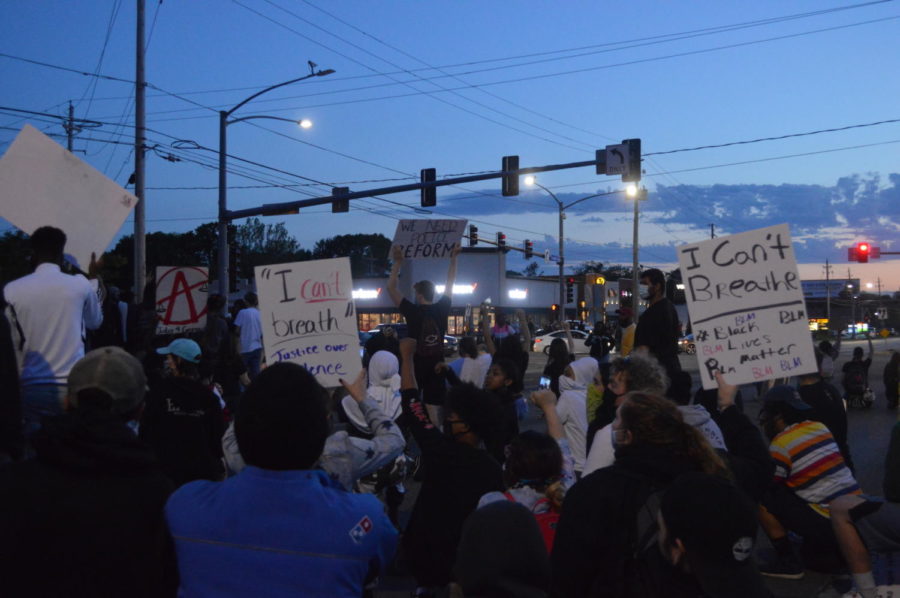Juneteenth: The history behind the holiday
During a night of protests in Des Moines, a group at Merle Hay Road and Douglas Avenue in Urbandale take a knee, encouraging Urbandale Police to do the same.
June 18, 2020
Its name deriving from its date of June 19th, the Juneteenth holiday is one of the oldest celebrations honoring the freedom of slavery.
In 1865, it was on June 19th that the Union soldiers, led by Maj. Gen. Gordon Granger, announced at Galveston, Texas, that the Civil War had ended and that the enslaved African Americans were now free. This was announced two and a half years after President Abraham Lincoln declared the Emancipation Proclamation, which became official January 1, 1863.
The Emancipation Proclamation had little impact on Texas due to the minimal number of Union troops to enforce the new executive order. However, with the surrender of Confederate Gen. Robert E. Lee in April of 1865 and the arrival of Union Gen. Gordon Granger’s regiment, the forces were finally strong enough to influence and overcome the resistance.
The holiday is also called “Juneteenth Independence Day,” “Freedom Day” or “Emancipation Day.”
Juneteenth is one of the oldest celebrations honoring the freedom of slavery. The celebration grew its popularity in 1872, when a group of African American ministers and businessmen in Houston purchased 10 acres of land and created Emancipation Park. This was the space that held all the Juneteenth celebrations.
On January 1, 1980, Al Edwards, an African American state legislator, helped Juneteenth become an official holiday in Texas. As of that Juneteenth, every state except for Hawaii, North Dakota and South Dakota has accepted Juneteenth as a national holiday.
According to the New York Times, on Tuesday, Virginia Gov. Ralph Northam said he would propose legislation to make Juneteenth a paid state holiday and on Wednesday, New York Gov. Andrew Cuomo declared the anniversary a holiday for state employees. Also this month, many store retailers and companies have said they want to designate Juneteenth as a paid holiday.
On April 11, 2002, then-Iowa Gov. Tom Vilsack signed legislation establishing Juneteenth as a state holiday in Iowa. The holiday is known as Juneteenth National Freedom Day. Iowa is the seventh state to recognize Juneteenth as a national holiday.
According to the Iowa Department of Human Rights, the Iowa Juneteenth Observance normally has a statewide scope of programming that spans an eight-day period and focuses on education and entertainment activities related to freedom, liberty and responsible citizenship. Because of the COVID-19 global pandemic, they decided to hold a three-day virtual celebration of the holiday. Their in-person activities usually included family fun and economic, political and social development.
“It is a time to be joyful, it is a time to recognize that we made it this far, we can go farther, we have a responsibility to ourselves to remember the hardships our ancestors endured to gain the possibility of a new beginning,” said Ames NAACP President Edna Clinton. “The opportunity to come together and hear speakers and to encourage others and to have just a good old fashioned party with some education in it because there’s eating, dancing, praying, listening to people talk and sharing. It’s a time to remind us not to forget how far we’ve come and at the same time how far we still have to go.”
The Iowa Juneteenth celebration, which is normally celebrated in Des Moines, was honored at parades and held nominations for King and Queen of Juneteenth and other local achievements.
“Juneteenth is a day of celebration and reflection. Celebration of my ancestors’ emancipation from enslavement,” said Wesley Harris Jr., a graduate research assistant with a graduate degree in higher education. “Reflection on their lives and the history of not only my family’s experiences but also of Black folks kidnapped from the African continent, brought to the Americas, bred like livestock and tortured to build a country that has never loved us. Juneteenth represents Black people’s creation of and maintenance of our own traditions within a white supremacist nation that has repeatedly attempted to destroy us and any connection we have to the motherland. Yet, we are still here!”
With the recent events of the filmed killing of George Floyd, Breonna Taylor and Ahmaud Arbery, the importance of Juneteenth has grown since the incidents, causing the unity of the Black community to become stronger than ever.







